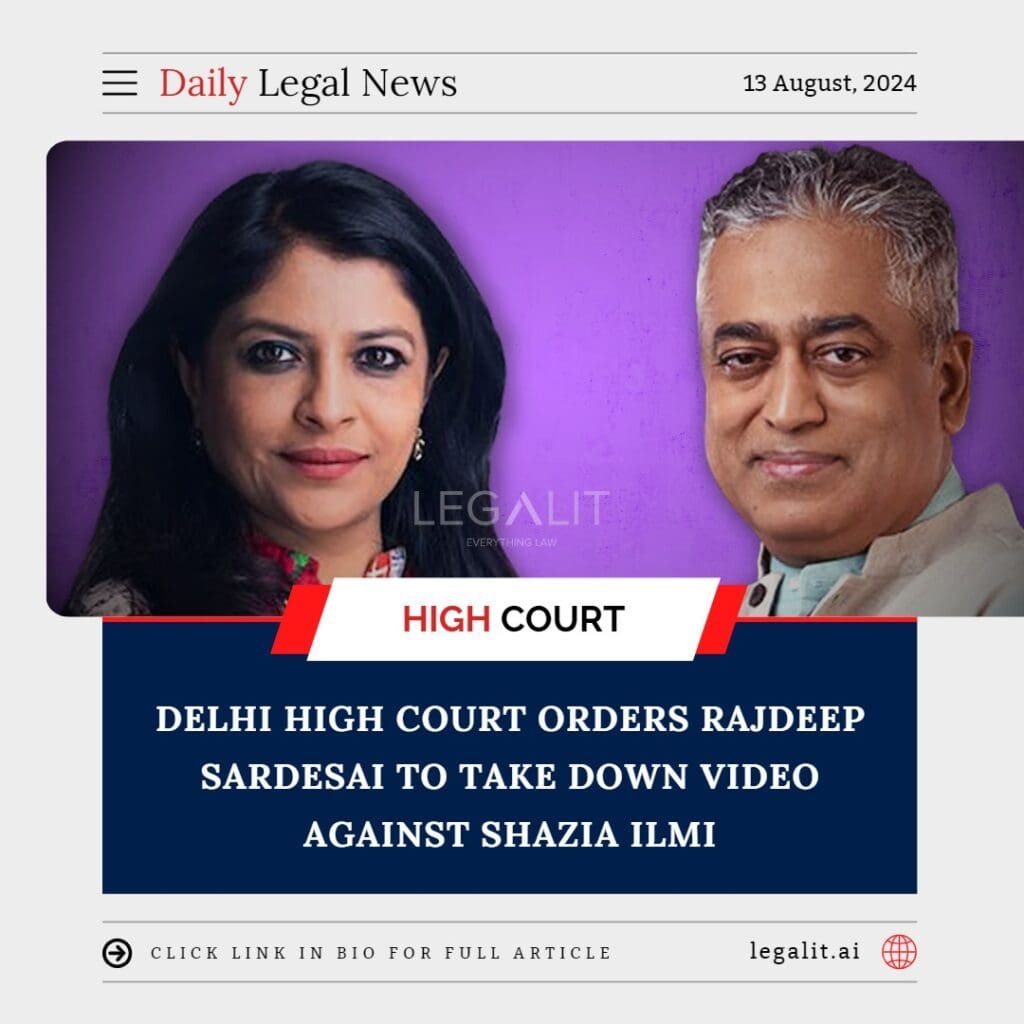
In a significant ruling, the Delhi High Court has ordered veteran journalist Rajdeep Sardesai to take down a video that was deemed defamatory against BJP leader Shazia Ilmi. This decision highlights the court’s stance on maintaining the balance between freedom of speech and protecting individuals from defamatory content, particularly in the context of social media and digital platforms.
Background of the Case
Shazia Ilmi, a prominent political figure and member of the Bharatiya Janata Party (BJP), filed a lawsuit against Rajdeep Sardesai, accusing him of making defamatory statements in a video that was widely circulated online. The video allegedly contained content that Ilmi argued was false, misleading, and damaging to her reputation and public image.
Rajdeep Sardesai, a well-known journalist with a significant following on social media, had posted the video on his digital platforms, where it garnered considerable attention. Ilmi’s legal team contended that the video not only harmed her reputation but also misrepresented facts, warranting legal action to protect her rights.
High Court’s Ruling
- Order to Take Down the Video: The Delhi High Court ruled in favor of Shazia Ilmi, directing Rajdeep Sardesai to take down the video from all platforms where it was posted. The court found that the content of the video was likely defamatory and could cause irreparable harm to Ilmi’s reputation.
- Defamation and Reputation: The court emphasized that while freedom of speech is a fundamental right, it does not extend to making unfounded or defamatory allegations against individuals. The ruling underscores the need to balance free expression with the right of individuals to protect their reputation.
- Temporary Relief: The order to remove the video serves as temporary relief for Ilmi, pending the final outcome of the defamation case. The court’s decision to grant this relief indicates the seriousness with which it views the potential harm caused by the video’s content.
- Legal Precedent: The ruling contributes to the ongoing legal discourse on defamation in the digital age, particularly regarding the responsibilities of journalists and public figures when posting content on social media.
Implications of the Ruling
The Delhi High Court’s decision to order the removal of the video has several important implications:
- Accountability on Digital Platforms: The ruling reinforces the accountability of journalists and other public figures when using digital platforms to share content. It sends a message that statements made online are subject to the same legal standards as those made in traditional media.
- Protection of Reputation: The decision highlights the court’s role in protecting individuals from defamatory content, especially in cases where the content has the potential to reach a wide audience quickly.
- Freedom of Speech vs. Defamation: The case illustrates the ongoing tension between freedom of speech and the right to protect one’s reputation. The court’s ruling seeks to balance these rights, ensuring that free expression does not come at the expense of causing unwarranted harm to others.
- Precedent for Future Cases: The ruling could set a precedent for how courts handle similar cases involving defamatory content on digital platforms, potentially leading to more stringent scrutiny of online statements.
Moving Forward
Following the court’s order, several steps will be important for the parties involved and the broader public:
- Compliance with the Order: Rajdeep Sardesai must comply with the court’s order to remove the video from all platforms, ensuring that the content is no longer accessible to the public.
- Ongoing Legal Proceedings: The defamation case will continue to be heard in court, where both parties will present their arguments and evidence. The final outcome will determine whether the statements in the video were indeed defamatory.
- Awareness Among Public Figures: The case serves as a reminder to journalists and public figures about the importance of verifying facts and considering the potential impact of their statements before posting content online.
- Legal Guidance on Digital Content: As digital platforms continue to play a significant role in public discourse, legal professionals and content creators should seek guidance on the boundaries of free speech and defamation to avoid legal repercussions.
Conclusion
The Delhi High Court’s order for Rajdeep Sardesai to take down a video deemed defamatory against Shazia Ilmi highlights the court’s commitment to protecting individuals from harmful and misleading content in the digital age. While upholding the principle of freedom of speech, the ruling emphasizes that this right must be exercised responsibly, without infringing on the reputation and dignity of others. As the defamation case progresses, the outcome will further clarify the legal standards for online content and the responsibilities of those who shape public opinion through digital media.